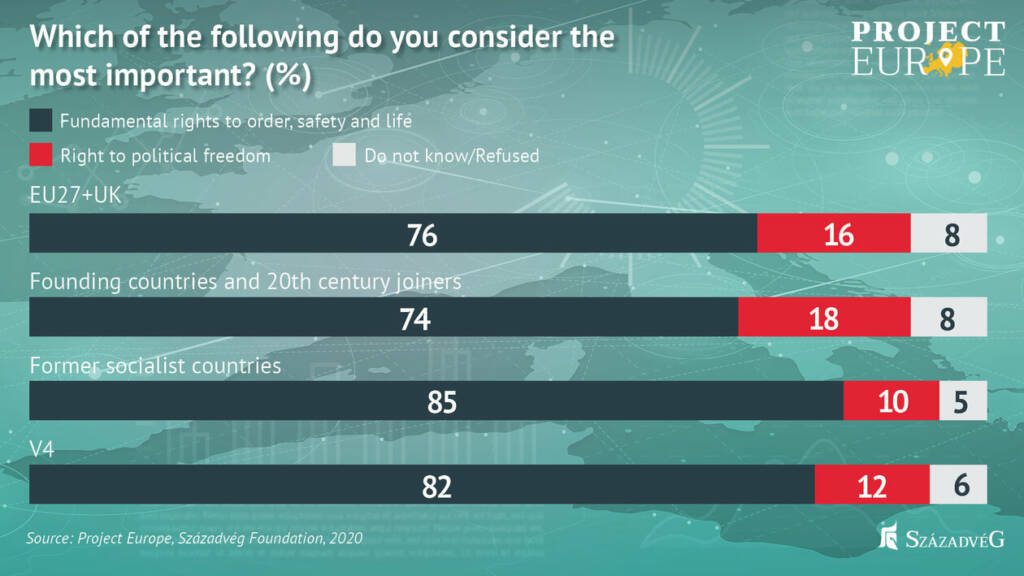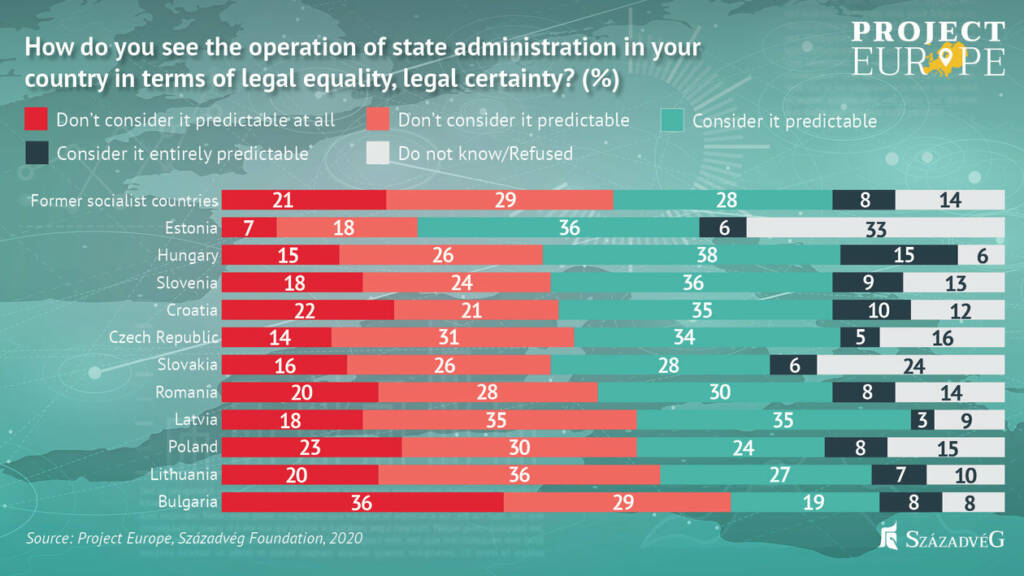This article has been published online on December 8, 2020 on the site of the Századvég Institute.
In recent years, security and order and the conflict between human rights and political freedoms, such as mass migration and terrorism, have often been an issue. The global viral outbreak in 2020 has also highlighted the partial contradiction between freedoms and the legitimate aspects of security. The analysis based on the research of Project Europe conducted by Századvég examines how citizens in the 27 Member States of the European Union and the United Kingdom view the issue of order and freedoms, and how they see the situation of legal certainty and equality of rights in their own country.
The research shows that more than three-quarters (76 percent) of European citizens put the rights to order, security and protection of life first, according to importance, and only one in six respondents (16 percent) said that political freedoms are more important to them. Interestingly, the issue of security is more prominent among the former socialist countries and the V4, compared to the European average. Eighty-five percent of the citizens of the former socialist bloc and 82 percent of the respondents in the four Visegrad countries – Poland, Hungary, the Czech Republic and Slovakia – put the rights to order, security and protection of life first. In contrast, 10 percent of the respondents in the former socialist countries and 12 percent of the respondents in the V4 countries consider political freedoms to be more important.
Examined by country, Malta and Cyprus have the highest proportions regarding the importance of political freedoms (32 and 30 percent), while Romania (5 percent), Croatia (6 percent) and Slovenia (6 percent) have the lowest. In Western Europe, more people put freedoms first than in the Eastern Member States of the European Union, but in France, as a country particularly affected by migration and waves of terrorism, 70 percent of the respondents prefer order, and only one-sixth (17 percent) stated otherwise. In Hungary, three-quarters of the respondents (75 percent) consider rights to order, security and protection of life to be more important, while 15 percent agree with the primacy of political freedoms.
The survey also covered whether EU and British citizens considered the functioning of public administration in their own country to be adequate in terms of equality of rights and legal certainty. It can be stated that almost half of the respondents from the twenty-eight countries (46 percent) consider the functioning of public administration to be predictable, while 35 percent of them expressed the opposite opinion. Thirty-six percent of the citizens of the former socialist countries and 36 percent of the citizens of the V4 countries considered the functioning of state administration to be adequate from a legal certainty point of view. In contrast, 50 percent of them in both cases did not think that the actions of authorities and agencies are consistent regarding the equality of rights and legal certainty.
Examining the differences by country, the proportion of those objecting to the actions of public administration regarding the equality of rights and legal certainty is the highest in Bulgaria (65 percent) and Lithuania (56 percent), while it is the lowest in Luxembourg (18 percent) and the United Kingdom (23 percent). It is important to emphasize that the assessment of the operation of agencies in Hungary is much more favourable than in most of the former socialist countries. The research reveals that 53 percent of Hungarians think that the operation of the Hungarian authorities is predictable, and 41 percent thought otherwise.
Overall, the results of the survey point out the European countries’ different historical and current social realities. The waves of crises of the last decade – the global economic crisis, the migration crisis and its consequences, the pandemic crisis – as well as the experience gained, may have contributed to the fact that the vast majority of European citizens today put order and security first, and think the prevalence of political freedoms is less important in everyday life. At the same time, the citizens of the Western Member States, having democracy for more than half a century longer, are, on the whole, more satisfied with justice in the world of authorities and agencies than the EU Member States that were democratized thirty years ago. This does not mean that the “Easterners” would not enjoy freedom and protection in their own legal system in many respects. Rather, they are less satisfied with the exercise of their social or even economic rights than most of their Western European counterparts.
The Project Europe research
In the first half of 2016, the Századvég Foundation conducted a public opinion poll survey covering all 28 European Union Member States, with the aim to analyse the opinions of EU citizens regarding the issues that most affect the future of the EU. In a unique way, Project28 conducted the widest possible survey of 1,000, that is a total of 28,000 randomly selected adults in each country. Gaining an understanding of society’s sense of prosperity and mapping the population’s attitudes towards the performance of the European Union, the migration crisis and the increasing terrorism were among the most important goals of the analysis. The Századvég Foundation, on behalf of the Hungarian Government, conducted the research again in 2017, 2018 and 2019, which continued to reflect on the topics that most determined the European political and social discourse.
In 2020, the survey, now called the Project Europe, will continue, with the aim of mapping the population’s attitude towards the most important public issues affecting our continent. In addition to society’s sense of prosperity, the performance of the European Union and the attitudes towards the migration crisis, in line with the latest challenges affecting Europe, the dominant theme of this year’s poll is the coronavirus pandemic, climate change and anti-Semitism. In addition to the European Union Member States, the 2020 research covered the United Kingdom, Norway and Switzerland, interviewing a total of 30,000 randomly selected adults using the CATI method.





